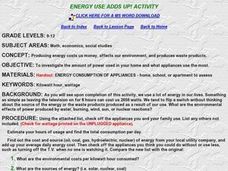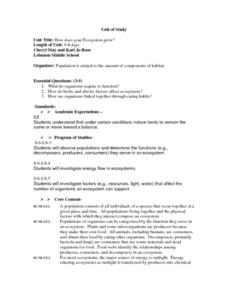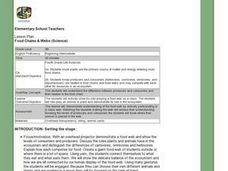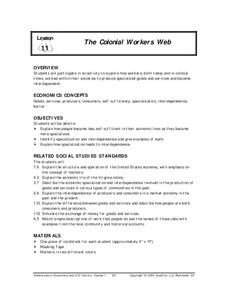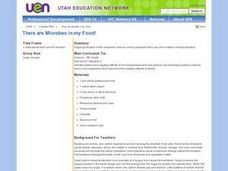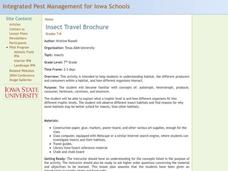Council for Economic Education
Paper Money of the Sung, Yuan, and Ming Dynasties
Why did the Chinese develop paper money? They were the first society to use paper currency. Learners consider why paper money was more convenient than other mechanisms of trade using a helpful lesson plan, which includes a graphic...
Scholastic
Study Jams! Food Webs
Rhinozilla is back to take your lesson plan on trophic levels a step higher! After showing the video on food chains (available through the See All Related Jams button), add to it by showing this one. It deals with omnivores and food...
Curated OER
Sustainability and Extinction
Galapagos Penguins are the only penguins on earth that live north of the equator (in the wild). In this last lesson plan a discussion on how the Galapagos islands developed their populations and diversity sparks the introduction. Two...
NASA
Biology Training Module
Are you a koalafied biologist? The lesson begins with research about human survival and our ecosystem. Then, an online training module simulates the effects of changes to the plants and animals in an ecosystem. Finally, scholars research...
DiscoverE
Waterproofing the Roof
Can your pupils build a roof that stands the test of time? Use an insightful engineering design project to highlight both materials science and architecture. Scholars either team up or work as individuals to design, create, and test a...
Curated OER
ENERGY USE ADDS UP!
Students investigate the amount of power used in your home and what appliances use the most. They analyze the concept that producing energy costs us money, affects our environment and produces waste products. Students come up with three...
Curated OER
How Does Your Ecosystem Grow?
Students consider that under certain conditions in nature tend to remain the same or move toward a balance. They observe populations and determine the functions (e.g., de-composers, producers, consumers) they serve in an ecosystem. They...
Curated OER
Food Chains & Webs
Fourth graders examine roles of animals in food chain, explore roles of humans, plants, and animals in ecosystem, create their own food webs, and role play producers, consumers, and decomposers.
Curated OER
Lessons: Food Web
Students use an interactive web-based food web game to gain familiarity with tropic levels and interactions. They already understand that in an ecosystem there are four basic tropic levels: producers, primary consumers, secondary...
Curated OER
The Colonial Workers Web
Students explore how workers, both today and in colonial times, worked within their societies to produce specialized goods and services and became interdependent. They explain how people became less self sufficient in their economic...
Curated OER
Forest Ecosystem
Students become familiar with the temperate rainforest. In this forest ecosystem instructional activity, students identify the producers, consumers and decomposers in the forest ecosystem. Students sort cards and identify the trophic...
Curated OER
There are Microbes in my Food!
Sixth graders produce yogurt in the classroom as an example of the use of microbes in food production, and record observations in science journals.
Curated OER
Marshland Ecosystems
Students identify animals in ecosystem depicted on 16th Century ceramic basin and classify them as herbivores, carnivores, or omnivores based on physical characteristics and prior knowledge, determine which life forms in ecosystem are...
World Wildlife Federation
Food Chains and Food Webs
As part of a study of food chains and food webs, class members complete a series of worksheets that trace a marine chain from producers to consumers or decomposers. After studying a food chain example, young marine biologists make up...
Curated OER
Insect Travel Brochure
Students explore the concept of insects and their habitats. In this insect habitat lesson, students create travel brochures for particular insects. Students must include habitat, producers, and consumers with in the vacation spot.
Curated OER
Conservation in Costa Rica
Students brainstorm what they do that requires land use and use a worksheet to calculate their footprint (the total area of land and water required to produce all the resources they consume). They then compare their footprints to each...
Curated OER
Export-Import Game
Students recognize how international trade affects them as consumers and become familiar with basic agricultural crops grown in Kentucky. They identify items used in their daily lives and .heir place of origin and examine export/import...
Curated OER
Space Age Technology Comes to Earth
Students explore eight career and technical areas and make connections with business, family and consumers, and technology. They examine and describe how agriculture and natural resources impact our quality of life. They explore and...
Curated OER
Monstrous Mutations
Learners investigate mutations and simulate their mutation while trying to collect food. In this mutations lesson plan, students pick an identified mutation out of a paper bag. They simulate their mutation while trying to collect food...
Curated OER
Economic Recovery? a Comparison of Indicators for Utah And the United States Since March 2001
Students discuss key business and consumer indicators that are used to measure the health of the economy. They compare the economic recovery (from the 2001 recession) of Utah and the United States. They discuss the benefits and...
Curated OER
Food Web
Students identify producers and consumers, including scavengers and decomposers, and discuss role each plays in food web. They then make diagram of possible food chain that might include skull pictured on Montana's quarter, and...
Curated OER
LEAF (Learning Exercises and Activities in the Forest
Students observe populations and determine the functions (e.g., decomposers, producers, consumers) they serve in an ecosystem. They investigate the energy flow ecosystems. Students investigate factors (.g., Resources, light, water) that...
Curated OER
Insect Pitfall Traps
Young scholars ask testable questions, use the inquiry cycle to investigate, gather data and interpret the results, study the diversity of insects and other smallorganisms which live around the school; they can make an inventory...
Curated OER
Alternative Practices of Agriculture
For this agriculture worksheet, students read the pages related to the discovery and practice of alternative ways of producing new crops. Then the graphic organizer is filled out for each idea.
Other popular searches
- Producers and Consumers
- Producers an Consumers
- Producers Consumers
- Science Producers Consumers
- Producers and Consumers Poem
- Marine Producers Consumers
- Producers Consumers Writing
- Producers, Consumers







